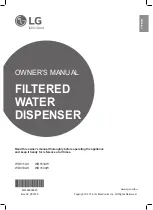
14
1 ELECTRICAL SAFETY INSTRUCTIONS
1
Before connecting the dispenser to the mains, check that
the voltage shown on the rating plate matches your electricity
supply. Connect the dispenser to a single-phase supply
through an earthed socket as required by current regulations. If
the dispenser is to be disconnected from the power supply
using a single pole switch, the gap between the contacts on this
switch must be sufficiently wide to guarantee full disconnection
under category III overload conditions.?
2
Do not use extension cables to connect the appliance.
3
To avoid any risks, if the power cable is damaged, it must
be replaced by the manufacturer, by an authorised technician
or by a similarly qualified person.
4
The dispenser is not suitable for outdoor use.
5
The dispenser must be installed in the upright position.
6
Before cleaning, always disconnect the dispenser by
removing the plug from the socket.
7
Always disconnect the dispenser before removing any of
the panels for cleaning or maintenance work.
8
Do not use a water jet to clean the dispenser.
9
This appliance must not be operated by children.
10
Do not let children play with the appliance.
11
This appliance must not be used by persons with reduced
physical, sensory or mental capabilities or with a lack of
experience and knowledge unless they have supervision or
have been trained regarding the safe use of the appliance and
understand the risks involved.
12
Only persons who know and have practical experience of
the appliance are permitted access to the inner components of
the dispenser, especially when dealing with issues regarding
safety and hygiene.
2 HYGIENIC SAFETY INSTRUCTIONS
1
This appliance is intended exclusively for domestic and
similar use.
2
For the appliance to operate correctly, room temperature
must be b5° and +32°C.
3
Use the appliance to cool the indicated liquids only.
4
Do not introduce dangerous or toxic liquids to the appliance.
3 TECHNICAL CHARACTERISTICS
We reserve the right to amend this manual without notice.
4 INTRODUCTION
Read this instruction booklet carefully in order to familiarise
yourself with all aspects of the dispenser.
Like all mechanical products, this machine will require cleaning
and maintenance. Good operation can also be affected by any
errors made by the operator during disassembly and cleaning.
For this reason, in the case of daily operations such as
disassembly, cleaning, sanitising and reassembly, it is important
that the person using the dispenser is aware of the procedures
and can perform them without making errors.
5 INSTALLATION
1
Remove the dispenser from the packaging, which you
should keep in case it is needed in the future.
2
Check that the dispenser has not been damaged during
transport. If it has, make a report to the carrier immediately.
3
Position the dispenser on a bench capable of supporting the
weight, even at full load,
bearing in mind the IMPORTANT
Transparent removable bowls
n
1
2
3
1
2
3
Capacity of each bowl, approx.
l
6
6
6 10 10 10
Dimensions:
width
cm
20 40 60 20 40 60
depth
cm
50 50 50 50 50 50
height
cm
62 62 62 70 70 70
Net weight, approx.
kg
23 41 57 25 45 61
Gross weight, approx.
kg
25 44 60 27 48 64
Hermetic compressor
Air-cooled condenser
Overload protector
Noise level lower than 70 dB (A)
IMPORTANT
Electrical characteristics: read the data on the plate of
each individual dispenser. This is located at the bottom
of the front panel, behind the drip tray on the right. The
serial numbers of the devices (preceded by the symbol #)
are shown on the frame below. Always refer to the data
shown on the plate.
IMPORTANT
When transporting or lifting the dispenser, never pick it
up by the transparent containers or the evaporator cylin-
ders. The manufacturer is not liable for damage caused
by such mishandling.
NG
6
/1
NG
6
/2
NG
6/
3
NG 10/1
NG 10/2
NG 10/3















































